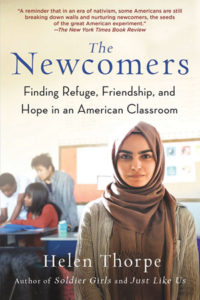The Newcomers: Finding Refuge, Friendship, and Hope in an American Classroom
Reviewed by Dave Austin
June 1, 2018
 By Helen Thorpe. Scribner, 2017. 396 pages. $28/hardcover; $18/paperback (available in September); $14.99/eBook.
By Helen Thorpe. Scribner, 2017. 396 pages. $28/hardcover; $18/paperback (available in September); $14.99/eBook.
Buy from QuakerBooks
Imagine if you can that you are, say, 15 years old. You’ve spent part, if not all, of your short life in someplace other than where you should call home: perhaps a war zone, perhaps the homes of relatives you don’t really know, perhaps a series of refugee camps. Now you are living in an even stranger place called Denver, Colorado. You’ve been dropped into a high school classroom where no one speaks your language, no one understands your culture, and no one has a clue as to what you and your family have been through. Your parents can’t find work (or if they can, they struggle to pay the bills); there’s a problem keeping food in the refrigerator; and the end of each month brings with it the worry that you might end up homeless. Perhaps you’re struggling with PTSD from the trauma you’ve suffered, but you can’t get the help you need because you can’t communicate with anyone. You have no friends, except the ones you left behind, in that war zone.
Oh, and there’s a man running for the office of president of your new country who’s telling his supporters that folks like you are rapists, drug dealers, gang members, and/or terrorists.
Sound tough? Meet the teenagers in Mr. Williams’s class at Denver’s South High School.
Journalist Helen Thorpe, whose previous books have dealt with the journeys of four undocumented young women from Mexico and the experiences of U.S. military women deployed to Iraq and Afghanistan, spent the 2015-2016 school year as a guest—and sometimes classroom assistant, counselor, and confidante—in a beginner-level English Language Acquisition class with 22 kids who spoke 14 different languages. Thorpe wanted to write about refugees and their struggles as newcomers to the United States, but from a perspective different from what’s usually presented to us. She decided to focus on newly arrived teens. And so we learn the stories of the flirtatious and effervescent Lisbeth from El Salvador; the complicated sisters, Mariam and Jakleen, from Iraq; the hard-working brothers from the Democratic Republic of Congo, Methusella and Solomon; and the others, some of whom excel in this busy and sometimes boisterous classroom, and some who struggle, if they attend school at all. Each carries a lifetime’s worth of experiences that most Americans cannot even begin to comprehend. Thorpe not only spends time with the students in their classroom, but she visits their homes and learns their families’ stories. There is much darkness in these journeys, as well as resiliency and perseverance. While some of these lives are the stuff of nightmares, what each family clings to is the idea that the American Dream can be theirs. Most will succeed; all will struggle.
This is also the story of a gifted and dedicated educator. Eddie Williams—himself half-Latino, half-Anglo—is by turns exuberant, creative, compassionate, perplexed, anguished, exasperated, and exhausted. Any teacher reading this book will be able to relate to his frustrations and successes, but few of us can really identify with the boatload of challenges he has to juggle on a daily if not hourly basis. As a teacher, I found his part of the story to be energizing and inspiring. Williams is supported by equally committed colleagues, administrators, and parents. As portrayed by Thorpe, Denver’s South High represents what is best about public education in our country.
These are refugee stories, yes, but unlike so many of the stories of refugees that we see in the media—the stories of terror, loss, and tragedy—Thorpe’s book tells the story of what happens later, of, as she says, “transformation,” of how one becomes an American in an America that isn’t always friendly and welcoming. Thorpe frequently references her own family’s experiences as immigrants from Ireland, which serve to remind the reader that these “newcomers” have much in common with many of our own family stories. Some of us seem to forget that sometimes.
As I write this review, our elected officials are again struggling over the issue of immigration. What is frequently lost in the heated (and many times, bigoted) political rhetoric is the simple fact that refugees and immigrants are actual people, with real names, real lives, real experiences. Some of them are teenagers, like the ones in Mr. Williams’s class. One way or another, they will be the future of this country. Helen Thorpe’s powerful, deeply affecting writing presents us with their unique and shared stories—of pain, trauma, fear, friendship, community, and in the end, hope.
And we all could use a heaping helping of hope these days. Seek out this book.



Comments on Friendsjournal.org may be used in the Forum of the print magazine and may be edited for length and clarity.